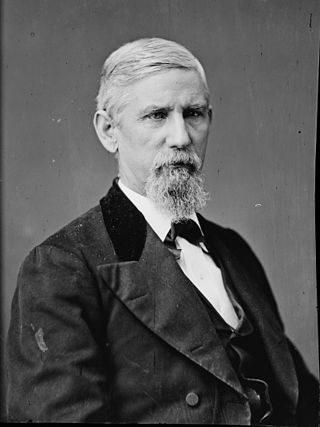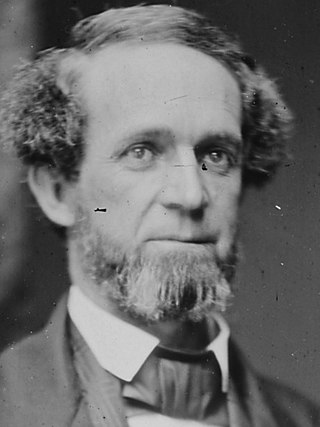Cumberland School of Law is an ABA-accredited law school at Samford University in Homewood, Alabama, United States. It was founded in 1847 at Cumberland University in Lebanon, Tennessee and is the 11th oldest law school in the United States.

George Washington Campbell was an American statesman who served as a U.S. Representative, Senator, Tennessee Supreme Court Justice, U.S. Ambassador to Russia and the 5th United States Secretary of the Treasury from February to October 1814.
These are tables of congressional delegations from Tennessee to the United States House of Representatives and the United States Senate.

Washington Curran Whitthorne was a Tennessee attorney, Democratic politician, and an Adjutant General in the Confederate Army.

The 1864–65 United States House of Representatives elections were held on various dates in various states between June 5, 1864, and November 7, 1865, in the midst of the American Civil War and President Abraham Lincoln's reelection. Each state set its own date for its elections to the House of Representatives. Members were elected before the first session of the 39th United States Congress convened on December 4, 1865, including the at-large seat from the new state of Nevada, and the 8 from Tennessee, the first secessionist state to be readmitted. The other 10 secessionist states had not yet been readmitted, and therefore were not seated.

The 1796–97 United States House of Representatives elections took place in the various states took place between August 12, 1796, and October 15, 1797. Each state set its own date for its elections to the House of Representatives. The size of the House increased to 106 seats after Tennessee became the 16th state to join the union. The first session of the 5th United States Congress was convened on May 15, 1797, at the proclamation of the new President of the United States, John Adams. Since Kentucky and Tennessee had not yet voted, they were unrepresented until the second session began on November 13, 1797.

Finis James Garrett was a United States representative from Tennessee and a Chief Judge of the United States Court of Customs and Patent Appeals.
Tennessee's 1st congressional district is the congressional district of northeast Tennessee, including all of Carter, Cocke, Greene, Hamblen, Hancock, Hawkins, Johnson, Sullivan, Unicoi, Washington, and Sevier counties and parts of Jefferson County. It is largely coextensive with the Tennessee portion of the Tri-Cities region of northeast Tennessee and southwest Virginia. With a Cook Partisan Voting Index rating of R+30, it is the most Republican district in Tennessee.
Tennessee's 9th congressional district is a congressional district in West Tennessee. It has been represented by Democrat Steve Cohen since 2007.

George Washington Jones was an American politician who represented Tennessee's fifth district in the United States House of Representatives. He served in the Confederate States Congress during the American Civil War.

The 1994 United States Senate special election in Tennessee was held November 8, 1994. Incumbent Democratic Senator Al Gore resigned from the Senate following his election as Vice President of the United States in 1992, and this led to the 1993 appointment of Harlan Mathews and the subsequent special election. Mathews did not seek election to finish the unexpired term, and Representative Jim Cooper subsequently became the Democratic nominee. However, the Republican nominee Fred Thompson won the seat in a decisive victory.

The 2014 United States Senate election in Tennessee took place on November 4, 2014, to elect a member of the United States Senate from the State of Tennessee. Incumbent Republican U.S. Senator Lamar Alexander defeated Democrat Gordon Ball, and was re-elected to a third term in office with 61.9% of the vote against 31.9%.

The 1796 United States House of Representatives election in Tennessee was held on October 15, 1796, to determine the first Congressman of Tennessee. Tennessee was admitted to the United States on June 1, 1796. Democratic-Republican candidate, Andrew Jackson defend his Nonpartisan opponent, James Roby, with 98.9% of the vote.

The 2018 Tennessee gubernatorial election took place on November 6, 2018, to elect the next governor of Tennessee, alongside other state and local elections. Incumbent Republican Governor Bill Haslam was term-limited, and is prohibited by the Constitution of Tennessee from seeking a third consecutive term. Republican candidate Bill Lee was elected with 59.6% of the vote, defeating Democratic nominee and former Nashville mayor Karl Dean.

The 1916 United States Senate election in Tennessee was held on November 7, 1916. Incumbent Democratic Senator Luke Lea ran for re-election to a second term, but was defeated for the Democratic nomination by U.S. Representative Kenneth McKellar. McKellar won the general election against Republican Governor of Tennessee Ben W. Hooper.

Elections in Tennessee are held to fill various local, state, and federal seats. Special elections may be held to fill vacancies at other points in time. Statewide legislative referrals and referendums may also be on the ballot in some elections. Tennessee is one of thirteen states that holds its presidential primaries on Super Tuesday.

Diana Lynn Harshbarger is an American pharmacist, businesswoman, and politician. A member of the Republican Party, she has served as the U.S. representative for Tennessee's 1st congressional district since January 3, 2021. Her district is based in the Tri-Cities area in northeastern Tennessee.

Tennessee state elections in 2020 were held on Tuesday, November 3, 2020. Primary elections for the United States Senate, United States House of Representatives, Tennessee Senate, and Tennessee House of Representatives, as well as various judicial retention elections, were held on August 6, 2020.









